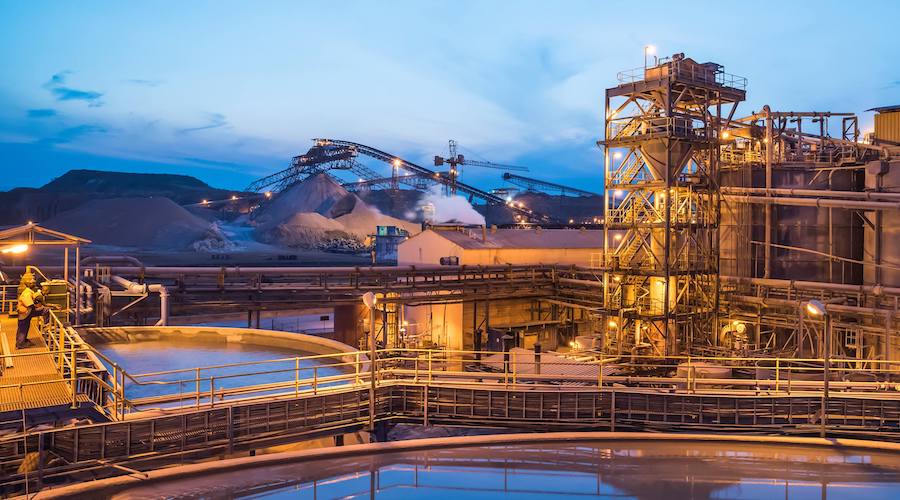Barrick Gold (TSX: ABX; NYSE: GOLD) faced criticism outside its annual general meeting on Tuesday in Toronto for supporting Malian rulers with ties to Russia.
The operator of the Loulo-Gounkoto gold complex in the West African country increased tax, royalty and dividend payments to the government by almost half to $380.7 million last year compared with 2022, according to company documents highlighted by The Washington, DC-based Blood Gold Report. Barrick’s production from the site remained constant at 547,000 oz., a company presentation shows.
“Even before this increase, Barrick Gold was already the junta’s single biggest taxpayer,” the Blood Gold Report said by email on Tuesday in response to questions. “In the past year, the Malian junta has fallen even further under Russian influence, with predictable consequences for human rights. In January, Malian armed forces assisted by foreign military personnel executed at least 25 civilians, according to a United Nations report.”
Blood Gold Report says it’s focused on links between western mining companies, authoritarian African governments and Russian mercenaries. It’s primarily concerned with operations in Mali, Central African Republic and Sudan. The group asked to speak with Barrick CEO Mark Bristow and chairman John Thornton, but wasn’t allowed into Tuesday’s meeting.
Local communities
The company under Bristow since 2019 has a strong record of respecting the countries where it operates. Its recent deals with Pakistan for the Reko Diq development give local state and national governments about half the $7 billion project. In Papua New Guinea, a new agreement for the Porgera mine gives locals more than half. And in Tanzania, Bristow has fostered a new culture at a mine that faced human rights abuse allegations under different management.
Barrick is one of several mining companies operating in Mali – the others are B2Gold (TSX: BTO; NYSE-AM: BTG), Allied Gold (TSX: AAUC) and Resolute Mining (ASX: RSG; LSE: RSG) – that are part of wider gold system that has contributed a total of some $3 billion to Russia since its invasion of Ukraine in early 2022, the advocacy group says.
B2Gold operates the Fekola mine in Mali’s southwest near the border with Senegal, but hasn’t increased its payments to the government, the Blood Gold Report said.
Barrick says it’s building schools in Mali and training the local workforce not just in mining but in business courses. Some 96% of employees are from Mali, 20% are employed directly from surrounding communities, for 1,348 permanent jobs at Loulo and Gounkoto, the company says. Other initiatives include local sanitation, anti-malaria efforts, vaccinations and food drives. It says it has built new pools and water tanks, upgraded roads and built seven farms to empower women.
The company has given more than twice as much to the Malian government as Ottawa’s C$352 million in humanitarian aid to Ukraine, noted The Blood Gold Report’s David Clement, one of its authors.
“This is an intolerable situation for all Canadians,” Clement said in emailed remarks. “Barrick Gold must withdraw from Mali immediately.”
Junta payments
Companies in Mali account for $10 million a month in payments to the junta, the Blood Gold Report says, citing United States intelligence reports. The junta revised the country’s gold mining code last year to increase the state’s stake in operations to 35% from 20%.
Russia is pressing for more money to be raised, the group says, citing a Mali-Russia agreement in November to build a metals refinery in Bamako. In January, Wagner seized the country’s largest artisanal mine, Intahaka in northern Mali, according to the Blood Gold Report.
Allied Gold runs the Sadiola open-pit mine in the country’s west. The company plans to expand its annual production to about 200,000 oz. a year over a six-year period.
Resolute Mining operates the Syama underground gold mine in southwest Mali, about 30 km from the country’s border with Cote d’Ivoire and roughly 300 km southeast of the capital Bamako.
A jihadist insurgency has destabilized the country’s north and killed thousands since 2012. The coup in 2021 was the second since 2020. Former colonial ruler France pulled out its last troops from Mali in 2022 as counter-terrorism efforts proved ineffective and the government brought in Wagner. UN peacekeepers also left.
In January, the country joined Burkina Faso and Niger – which also have governments installed by coups – in leaving the Economic Community of West African States, the area’s main trade hub, for fear of sanctions and having to promise elections.













